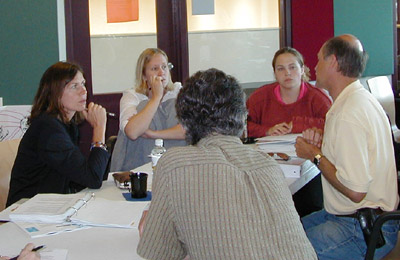| Key
Activities
| Challenges | What
We Learned
Supporting
Regional Efforts: Challenges
 We
faced a number of challenges in working to meet the needs of all
six states. We
faced a number of challenges in working to meet the needs of all
six states.
Differing
levels of needs and expertise
This is a limited time grant, making it a challenge to pull in states
that were not ready to address the inhalant problem when we were.
As a result, we’ve had states getting involved at different
times along the course of this short grant, leaving us with states
at different stages of commitment and readiness to benefit from
our project. A further challenge for us then became how to develop
trainings that satisfy the needs of everyone.
Fostering
innovation while maintaining standards
As Coalition staff, we need to let our state partners produce their
own materials and presentations, tailored to their own needs, yet
still guide them to use appropriate messages and best practices.
The adage, “A little bit of knowledge is a dangerous thing,”
applies here. Our challenge is to adequately train those people
who use our information to teach others, so that they do not spread
inappropriate messages and materials.
Lack
of research
Beyond our experts’ consensus and best practices, we need
research in this field that confirms which approaches work and which
don’t. We need research to develop evidence-based messages
and strategies. We need evaluated curricula with units on inhalants
that impact the choices children make.
Misinformation
There are well-intentioned materials (videos, news articles, pamphlets)
available to the public that give inappropriate or even dangerous
messages for the audience they are targeting. It is a continual
challenge to steer people away from these misguided materials.
|
